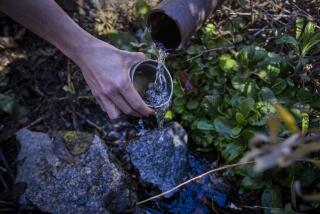Watercraft Fans Sue U.S. to Prevent Ban
- Share via
An Orange County-based group sued the federal government Thursday to halt impending bans on personal watercraft in 21 national recreation and seashore areas.
In addition to requiring officials to do environmental assessments of the effects of Jet Skis, WaveRunners and other small watercraft on the lakes, islands and coastal stretches, the American Watercraft Assn.’s lawsuit seeks an injunction to stop bans from taking effect in April and September.
“We’re not trying to gain access to every national park in the nation. We don’t necessarily believe that personal watercraft belong in every national park,” said Stephan Andranian, government affairs manager for the association, which is based in Foothill Ranch. “However, it’s impossible to find out where they do belong unless you do some assessments.”
The association, along with two personal watercraft users and an industry group, filed the lawsuit against the U.S. Department of Interior and the National Park Service in federal court in Texas. The association says it represents 20,000 of the nation’s estimated 1.3 million personal watercraft users.
Park Service and Interior officials could not be reached for comment Thursday.
The suit comes as the Bush administration is pushing to reopen wilderness areas for recreational use. On Wednesday, U.S. Bureau of Land Management officials said the agency wants to overturn key parts of a Clinton-era decision that helped preserve desert dunes in southeastern California, a move that would reopen thousands of acres to off-road vehicles. The administration is also reconsidering another Clinton-era plan to phase out all snowmobile use within Yellowstone National Park, starting next winter.
Andranian said the watercraft suit does not target pristine areas.
“Nobody’s going to argue that personal watercraft belong at Yosemite,” he said. “We’re talking about places like Lake Mead and Lake Powell that were built, in part, for motorized recreation.”
As part of a settlement with an environmental group in December 2000, the Park Service agreed to complete environmental assessments so personal watercraft could operate in certain areas. However, none of the assessments have been completed. If they are not finished this year, bans go into effect.
Environmentalists say the issue is already clear. According to the Sierra Club, studies show that a personal watercraft engine operating seven hours produces the same amount of cancer-causing and smog-forming pollutants as an automobile being driven more than 100,000 miles. Each year, small marine motors spill 15 times more oil and fuel into waterways than the Exxon Valdez did, the environmental group said.
“The engines are peculiarly inefficient,” said Paula Goodman Maccabee, a Sierra Club air-toxins campaign project coordinator in St. Paul, Minn.
The watercraft lawsuit seeks to block bans at Lake Mead in Arizona and Nevada; Whiskeytown, Calif.; Glen Canyon, Ariz.; Assateague, Md.; Curecanti National Recreation Area, Colo.; Lake Roosevelt, Wash.; Gateway and Fire Island, N.Y.; Big Thicket, Amistad, Lake Meredith and Padre Island, Texas; Gulf Islands, Florida; Cape Cod, Mass.; Indiana Dunes, Ill.; Cape Lookout, N.C.; Cumberland Island, Ga.; Pictured Rocks, Mich.; Delaware Water Gap, Pa.; Bighorn Canyon, Mont.; and Chickasaw, Okla.
More to Read
Sign up for Essential California
The most important California stories and recommendations in your inbox every morning.
You may occasionally receive promotional content from the Los Angeles Times.














